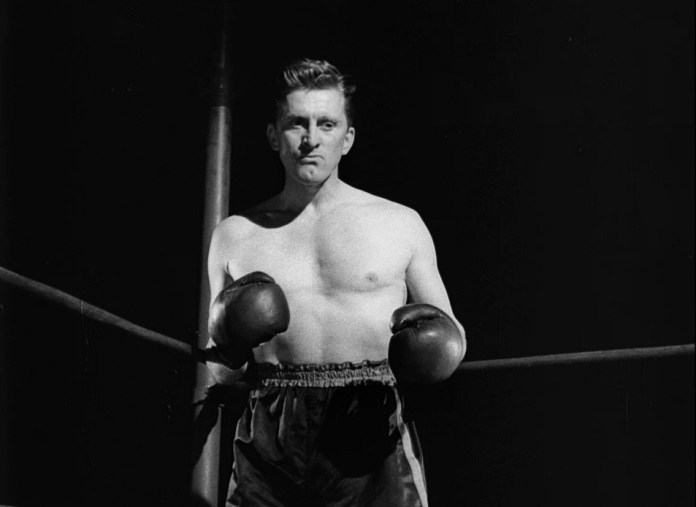At 103, Kirk Douglas was one of the very last links that we had to Hollywood’s ‘Golden Age.’ His passing yesterday leaves only a scattering of icons like Olivia De Havilland and Angela Lansbury to carry the torch for a generation that did so much to make the ‘40s and ‘50s such a glorious period to be a cinema lover. At his peak, Kirk Douglas’s star shone brighter than anyone’s.
In post-war Hollywood a new maturity emerged in mainstream cinema that reflected the horrors of what everyone had just experienced and acknowledged that life, while often a bowl of cherries was also a complicated, thwarted, bitter experience. Kirk Douglas (alongside Robert Mitchum) perfectly embodied this new breed of screen anti-hero for a darker, less sentimental age.
Tough, brawny, driven, angry, intelligent and beautiful, the clanking gears of his inner turmoil turning against one another positively rippled under his skin. His pairing with Mitchum in Jacques Tournier’s Out of The Past (1947) was his calling card, and the studios duly clamoured for his services.
It didn’t hurt that he possessed the kind of screen magnetism that a king’s fortune can’t buy you. Douglas could generate more screen tension by simply clenching his jaw than most actors could by firing a machine gun into the air. A friend of my father once told me that he was at a party in London and Kirk Douglas wandered in, causing at least three people to drop their wine glasses in shock: ‘He was so mesmerising, he didn’t even look human!’
Douglas was born Issur Danielovitch to Russian-Jewish parents. His early life as an impoverished immigrant in New York – and, reportedly the kind of non-loving father whose deliberate withdrawal of affection would leave most people in analysis for years – gave him a scrapper’s persistence that, combined with a tunnel-vision ambition, gave him the kind of drive that would propel him ever forwards throughout his career.
 An early spell on Broadway was interrupted when he served in the US Navy during the Second World War. Heading back to the stage, he was diverted over to Hollywood by his friend, Lauren Bacall. By 1949, he had landed his first Academy Award nomination for Best Actor, playing boxer Midge Kelly in Mark Robson’s hard-hitting Champion – the kind of role that marks you for life as one of the greats.
An early spell on Broadway was interrupted when he served in the US Navy during the Second World War. Heading back to the stage, he was diverted over to Hollywood by his friend, Lauren Bacall. By 1949, he had landed his first Academy Award nomination for Best Actor, playing boxer Midge Kelly in Mark Robson’s hard-hitting Champion – the kind of role that marks you for life as one of the greats.
Throughout the 1950s, he barely put a foot wrong, not only giving magnificent performances one after the other, but surrounding himself with some of the best writers and directors of the age. Think of Michael Curtiz’s Young Man With a Horn, Billy Wilder’s Ace In The Hole, or The Bad and The Beautiful and Lust For Life, both for director Vincente Minnelli. In the latter he gives perhaps his greatest performance as Vincent Van Gogh, whose tormented obsessions reflected his own inner conflicts.
By now a colossal star, in 1955 he set up Bryna Productions (named after his mother), which allowed him to take creative control of the films he wanted to make – perhaps, in the view of many who worked with him, a little bit too much control! If anything, the films he made during this period were even more impressive: The Vikings, Seven Days in May, Lonely Are The Brave and especially, the two movies he made with Stanley Kubrick, Paths of Glory and Spartacus, the part I suspect he’ll best be remembered for.
As producer of Spartacus, he hired Dalton Trumbo to write the script, despite Trumbo’s status as a blacklisted writer. Trumbo had written several scripts under various pseudonyms since Joseph McCarthy went after him, but Douglas insisted that he be credited under his real name, signalling an end to one of Hollywood’s most shameful acts of capitulation. (Douglas wrote a rather fine book on the subject, 2012’s I Am Spartacus.)
Things slowed down for a little in the 1970s and ‘80s. He spent a large part of the decade trying and failing to play Randall P MacMurphy in One Flew Over The Cuckoo’s Nest – he’d played the part successfully on stage – only for Jack Nicholson to win an Oscar in the eventual film produced, not without a little irony by Douglas’s son, Michael. Kirk Douglas, despite three nominations, absurdly, never won an Academy Award and had to make do with an Honorary Award in 1996.
There were some interesting roles still to play. In the late ‘70s he even tried his hand at horror, appearing in The Chosen, Saturn 3 and Brian DePalma’s far superior The Fury. He did, I feel duty-bound to acknowledge, also star in Hal Needham’s 1979 Cactus Jack (alongside a young Arnold Schwarzenegger) which was the first time I discovered that although largely magical, going to the cinema could also be a genuinely horrible experience.
Looking back on the last 75 years, there are few movie stars who radiated the kind of charisma of Kirk Douglas in his prime and who backed it up with so much, finely honed, aggressively raw talent. He tried his hand at directing and novel-writing to limited success, but who cares? In ‘Kirk Douglas’, Issur Danielovitch created a one-off; an inimitable 20th Century icon that defined an entire era. Not bad for a ragman’s son.










